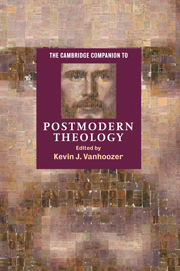12 - God and world
from Part 2 - Christian doctrine in postmodern perspective
Published online by Cambridge University Press: 28 May 2006
Summary
INTRODUCTION
The last years have seen a shift in the winds of culture. The approaching storm - or the dissipation of the existing storm clouds, depending on your perspective - has been widely heralded as the “postmodern shift.” Postmodernity has as many interpretations as it has advocates and critics put together, which renders it impossible to begin a chapter of this sort with a pithy definition. But all (or at least most) of its descriptions exhibit two important features: a thoroughgoing critique of the “modern project” (when and what that was being a matter of deep contention), and an insistence that the solution to the problems of modernity lies not in a return to premodern questions and answers, but rather in moving beyond the modern project to something radically new and different.
Certain stereotypes notwithstanding, theologians are highly sensitive to shifts in the wind. As Walter Lowe points out in chapter 14 of this volume, Karl Barth recognized the exhaustion of the “modern” German intellectual projects (Hegel, neo-Kantianism, von Harnack) already in the opening of the twentieth century and proclaimed an anti-modernist (and in that sense, at least, postmodern) program. With no less insight, Paul Tillich put his finger on the pulse of the postwar intellectual–existential climate when he published his highly successful The Courage to Be (1953) and began formulating his mature systematic theology. One detects a similar cultural acuity in the death-of-God movement, in Langdon Gilkey’s naming and reaping of whirlwinds, and the diverse forms of liberation theology that have left an indelible impression on theology at the turn of the millennium.
- Type
- Chapter
- Information
- The Cambridge Companion to Postmodern Theology , pp. 203 - 218Publisher: Cambridge University PressPrint publication year: 2003
- 1
- Cited by



